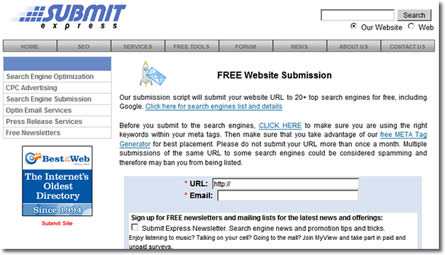|
 SEO is optimizing pages of your website to be well understandable by search engines so that they can index ('crawl') your site properly. Titles, meta description, meta keywords and image alternate tags are some ways we use in all our designed pages to ensure proper page indexing by search engines. SEO is optimizing pages of your website to be well understandable by search engines so that they can index ('crawl') your site properly. Titles, meta description, meta keywords and image alternate tags are some ways we use in all our designed pages to ensure proper page indexing by search engines.
In recent times, the term SEO has been misleading in that it can make your site's position to appear at the first page or even as the first result for your targeted keywords. This is not the case. How can every Tom, Dick and Harry have the top position for one keyword when there's only one slot there?
With Search Engine Marketing (SEM), you pay to appear at the top of search engine results, but these results will be highlighted as sponsored to differentiate from the organic results. With Search Engine Optimization (SEO), the website is tweaked to make it easier to be understood by the search engines thus ensuring the best ranking for your site.
We've read, watched and listened around. Here are some common scams that you may encounter with some SEO companies whom we won't reveal here, but would rather place on a general context:
1)
|
Guaranteeing Top Positions in Search Results Ranking Position (SERP)
Be wary of SEO companies promising #1 top spot ranking for search results. No site can guarantee you a No.1 position. Neither can they promise a position in the first or second page. Excerpt from Google's take on SEO:
No one can guarantee a #1 ranking on Google.
Beware of SEOs that claim to guarantee rankings, allege a "special relationship" with Google, or advertise a "priority submit" to Google.
There is no priority submit for Google...
If you see a site with such claims, they are usually accompanied by success stories to prove their point. So then, how did they manage to get those sites to the top SERPs? The answer is right smack there.
Still don't get it? Read again: success stories. Note the keyword, success. What happens to those unsuccessful ones? That's right, they're not 'featured' so as to attract more potential clients. Only the best cases are selected to be highlighted in their marketing.
We hear you asking: Then how did those success cases become successful? Doesn't that mean they did a good SEO job?
These success cases would most likely already have had lots of unique content and high incoming PR (PageRank) links, but were unoptimized (read: non-SEOed) for the search engines. By applying a few SEO techniques on the site's pages, search engines better understand the content and give the site a higher rank.
Some SEO services even offer a money-back guarantee if your site does not appear in the first page for your keyword after their optimizations. Sounds risk-free, but unfortunately there's no free lunch in this world. Check the fine print. Notice one keyword missing with the word 'guarantee', it's not a full money back guarantee.
That means, such companies will charge you something like 50% of the price first and the rest if the ranking results are good. That 50% may sound measly, but hear this - it usually runs in the thousands and covers their expenses and profits well enough. If their SEO works out to their promise, the 50% extra they get is simply a bonus. Essentially, you're paying the same amount as that is what most companies would pay them for their SEO work.
|
2) |
Submission to XXX (Usually Hundreds) of Search Engines
One common misleading scheme is the feature of 'XXX Search Engine Submission', with XXX indicating the number of search engines that your site will be submitted to.
Numbers here are made big to further entice you e.g. 'Submission to FIFTY Search Engines'. This submission process, from a layman's point of view, appears as if it requires lots of man hours or special business partnerships with the search engines.
In reality, it is only a simple one minute process. A simple Google search reveals one site that submits to 40 search engines at once, and that, for free. The other sites in the search results promise submission to more search engines. Now is it worth the additional $300++ you are paying for such a feature?

Free submission to 20+ search engines
Some go slightly further up and submit to Free-for-all (FFA) sites. These sites allow anyone to submit links which are updated to a single page. It ends up as one page littered with so many links (1000++) that your site doesn't even gain anything. In fact, posting your site at such sites can even penalize your site's rankings. Such FFA sites are often referred to as bad neighbourhoods - places where your site's ranking can be negatively affected.
In fact, there are only five major sites you need to submit your site to. Generally, for English sites, the five sites you should submit to are Google, Yahoo, Bing, Dmoz and Yahoo! Directory. Others are only needed if your site has a niche in their target audience.
Of the five, the easiest and simplest to submit to are the first three. Dmoz editors can take months to years to process site submissions with no visual feedback of the process, not even whether your site had been rejected. Yahoo! Directory requires a yearly payment to be listed on their directory. Hence the easiest to submit to are to Google, Yahoo and Bing.
|
3) |
Article and Press Releases Submission
Another highly non-advertised tactic is to create articles and press releases related to the company and submit to sites such as Articlesbase, Ezine Articles or 1888 Press Release. The way it works is like this: A site gets articles from these sites. Why? Free content. As they love to say in the SEO world, content is king.
In return, the site has to maintain the links and attribution contained in the article. As such, the press article and links to your site gets replicated on many webpages. This is where SEO comes in.
SEO companies submit articles with links to such article sites. This propagates the links to the content pulling sites as well. This is handy dandy, but is it worth the $2000 extra you pay some companies for? If your article writing skills are bad, we're pretty sure you can hire a copywriter for much less to write an article for you.
We've also seen some sites (including SEO companies) copying content from other sites and creating a website from it in order to create a high PageRank site. What makes it so unethical is that they do not credit the source of their content and go to the extent of rewriting certain parts of the article to make it unique. To add salt to the wound, such copied content would sometimes take higher rankings in the search engine than the original site. How would the original author feel?
Lately we've been seeing several Wordpress blogs setup that automatically pull content from Yahoo! Questions and adds the answers as comments to the article. It sounds as an effective SEO, but is essentially unethical and duplicates content.
|
4) |
Blogs and Link Directories
Another common tactic is to set up blogs and web directories for exchanging links. Exchanging and trading of links for the sole purpose of search engine rank manipulation is illegal.
Blogs are a good way to increase ranking of your website, but only if you create unique and useful content. What most of such blogs do is to create posts that only serve to promote their own company's product and services. These posts are heavily littered with keywords e.g. XXX, a Singapore web design provider, now offers new Singapore web design packages for the Singapore web design industry.
Some even go to the extent of stealing content from other sites to create blog posts. This is unethical and may cause search engines to give you negative points for having the same duplicate content.
It is good to have a blog - but post some interesting content! Did you discover something new today? A new web design technique? A JavaScript library or a CMS system that you found? Blog about it! Keep to the topic of your website, don't go posting things not totally related to the category of your site.
Directories are another common way that many SEO companies utilize. Most of them are automated and are rarely human edited. Such directories require the website owner to place a reciprocal link in order to be listed in the directory. This brings in more incoming links to the directory site thus increasing its PageRank. In the end, it is the directory site that benefits from all these, since it is the one receiving all the link backs from its listings.
|
5) |
Link Exchange Schemes
This is where a site links to the other on a reciprocal basis. The meaning of reciprocal is that a high ranking Site A will link to Site B and Site B will link to Site A. In this way, Site B gains some PageRank from Site A since Site A links to Site B.
However, the bottom line is the same as the previous directory method. Exchanging and trading of links for the sole purpose of search engine rank manipulation is illegal. Notice that Google provides links to report such sites.
We ourselves have received several e-mails requesting us to exchange links with the other party. Some even offered monetary gains. When we inform them that such links will be nofollow'ed (a way to notify search engines not to follow the link), we don't hear back from them.
|
6) |
Spamming Social Media Reviews / Community Forums / Article Comments
Believe it or not, some of the comments you see in popular blog posts (sometimes, even the blog post itself) and posts in the forums are companies posting under the guise of a consumer. A recent example is Belkin:

Belkin paid a employee to post positive reviews of the company's products
And they're not the only ones performing such unethical acts
In public forums, such forum users would usually have raked in lots of posts to build credibility, but behind the owner of the username lies someone who's main motive is to improve a company's image. At the same time, they also tend to support other companies in unrelated industries in order not to raise suspicions. They may openly claim to be a product supporter, but this usually does not go unnoticed.
Bloggers, especially high traffic sites enjoying a good name, can earn large sums of money by posting paid-for blog posts that seem to originate from the blog poster. Both parties benefit, the blogger gets paid, the company gets a better branding and more hits.
Highly unethical, but it works. However, once it is known that your blog accepts paid-for postings or that your company performs such marketing, your company's image gets heavily tarnished.
This is not to be confused with social media marketing where you leverage on social networking sites such as Facebook, Twitter and YouTube to create social awareness. This is fully ethical. It builds closer bonds with your end users and we strongly encourage it too.
|
Do your research. The above is not a exhaustive list. Go for a SEO company whose methods are legal and open. The above content, of course, is 100% our own research and experience laid out for you. Last updated on 5th August 2010.
|
|


